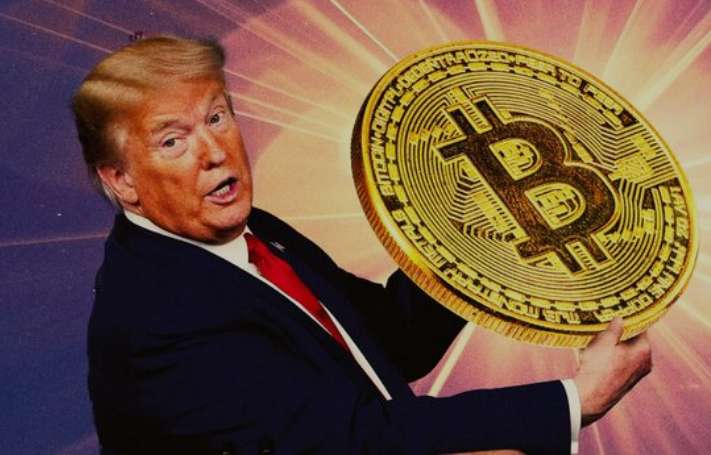Trump's Newest Way To Promote Crypto: GDP Data Goes Live on Blockchain
The U.S. government began publishing Gross Domestic Product (GDP) data on public blockchains on Thursday, marking the latest move by the Trump administration to support the cryptocurrency industry.Off

The U.S. government began publishing Gross Domestic Product (GDP) data on public blockchains on Thursday, marking the latest move by the Trump administration to support the cryptocurrency industry.
Officials from the U.S. Department of Commerce stated that this initiative will add a new channel for releasing economic data but will not replace existing methods.
By adopting blockchain technology to host some of its most critical and market-moving economic data, the Department of Commerce is effectively placing a "seal of approval" on the technology. Today, blockchain applications extend far beyond their origins in cryptocurrency and are increasingly used for trading various assets, including money market funds and stocks.
In its initial phase, this U.S. government initiative will cover nine blockchains, including Bitcoin, Ethereum, and Solana. The plan involves storing "cryptographic hashes" of the data on these blockchains—essentially a tool to verify data integrity.
Officials from the Department of Commerce mentioned that the administration, led by President Donald Trump, plans to expand the scope of this initiative in the future.
Shift in Government Policy
This policy shift comes just weeks after the Bureau of Labor Statistics (BLS) reported that job growth in recent months was significantly lower than previously announced figures. Subsequently, Trump dismissed the head of the BLS and, without providing evidence, suggested political manipulation of the data.
Department of Commerce officials stated that the blockchain initiative is unrelated to the dismissal of the BLS director.
Officials revealed that the driving force behind pushing data onto the blockchain is Secretary of Commerce Howard Lutnick. Earlier this year, Lutnick also proposed revising the methodology for calculating GDP to exclude the impact of government spending on the figure. GDP data is published by the Bureau of Economic Analysis, which operates under the Department of Commerce.
Governments worldwide have been exploring blockchain applications for years: some have used public networks to test central bank digital currencies, while others have considered using the technology for issuing digital credentials.
For example, the California Department of Motor Vehicles has adopted the Avalanche blockchain—one of the nine blockchains included in the Department of Commerce's data release initiative—to digitize vehicle ownership credentials. The U.S. Department of Homeland Security has also explored using the technology to streamline airport security screening processes.
Earlier this year, spurred by billionaire Elon Musk, the Trump administration's "Department of Government Efficiency" also looked into using blockchain to reduce costs and increase government transparency.
The "Crypto President"
Lutnick previewed this change during a White House cabinet meeting on Tuesday, telling Trump that departmental statistics would begin to be released via blockchain "because you are the 'crypto president.'"
Trump, once skeptical of cryptocurrencies, has now become a supporter of the industry—during his 2024 campaign, he pledged to reduce regulatory burdens hindering its development.
Upon taking office, he quickly took action to fulfill some of these promises: for instance, the Trump administration has established Bitcoin reserves and accumulated cryptocurrencies such as Ether and Solana; appointed crypto-friendly agency heads who have terminated enforcement investigations against companies like Coinbase Global Inc., the largest U.S. cryptocurrency exchange; and signed a stablecoin regulatory bill—stablecoins are designed to maintain a stable value pegged to underlying fiat currencies.
The Trump family's involvement in cryptocurrency has also expanded significantly, spanning businesses such as Bitcoin mining and stablecoin issuance. Next week, a cryptocurrency issued by World Liberty Financial, a company backed by the Trump family, will begin trading on centralized exchanges.
This stands in stark contrast to the administration of former President Joe Biden, whose regulatory agencies generally maintained a skeptical stance toward the cryptocurrency industry in recent years.
Cryptocurrency as a Political Force
The U.S. government's adoption of blockchain technology also reflects the evolution of the cryptocurrency industry itself. Years ago, many commercial attempts to deploy blockchain technology failed because they focused on applications using private blockchains—operated by companies that often had policy disagreements, leading to higher costs and greater implementation challenges.
However, under Lutnick's push, the Department of Commerce chose to utilize public blockchains like Ethereum, maintained by computers around the world and updated by volunteer programmers.
Officials stated that cryptocurrency exchanges Coinbase, Kraken, and Gemini are all participating in the Department of Commerce's initiative. The Department purchased cryptocurrencies (i.e., "gas fees") required to publish transactions on the blockchain through these exchanges. Kraken and Gemini are planning to go public in the coming months.
The cryptocurrency industry has become a political force to be reckoned with: investors and corporate executives exert influence through well-funded political action committees, similar to how traditional financial industries like banking wield power in Washington.
The industry has provided significant financial support for Trump's reelection campaign and has backed multiple crypto-friendly lawmakers in Congress. According to data analyzed by OpenSecrets, the cryptocurrency industry, including Coinbase, contributed over $133 million to three super PACs supporting "pro-crypto" candidates in the 2024 election.
Companies like Kraken and Coinbase also donated $1 million each to Trump's inauguration in January.
Lutnick hinted earlier this week that the potential applications of cryptocurrency extend far beyond publishing economic indicators.
During a meeting with Trump and other federal agency leaders on Tuesday, Lutnick said, "We will integrate GDP data into the blockchain to demonstrate its role in data distribution. Subsequently, we will open this capability to all government departments, enabling all of you to adopt this approach."
Disclaimer: The views in this article are from the original Creator and do not represent the views or position of Hawk Insight. The content of the article is for reference, communication and learning only, and does not constitute investment advice. If it involves copyright issues, please contact us for deletion.